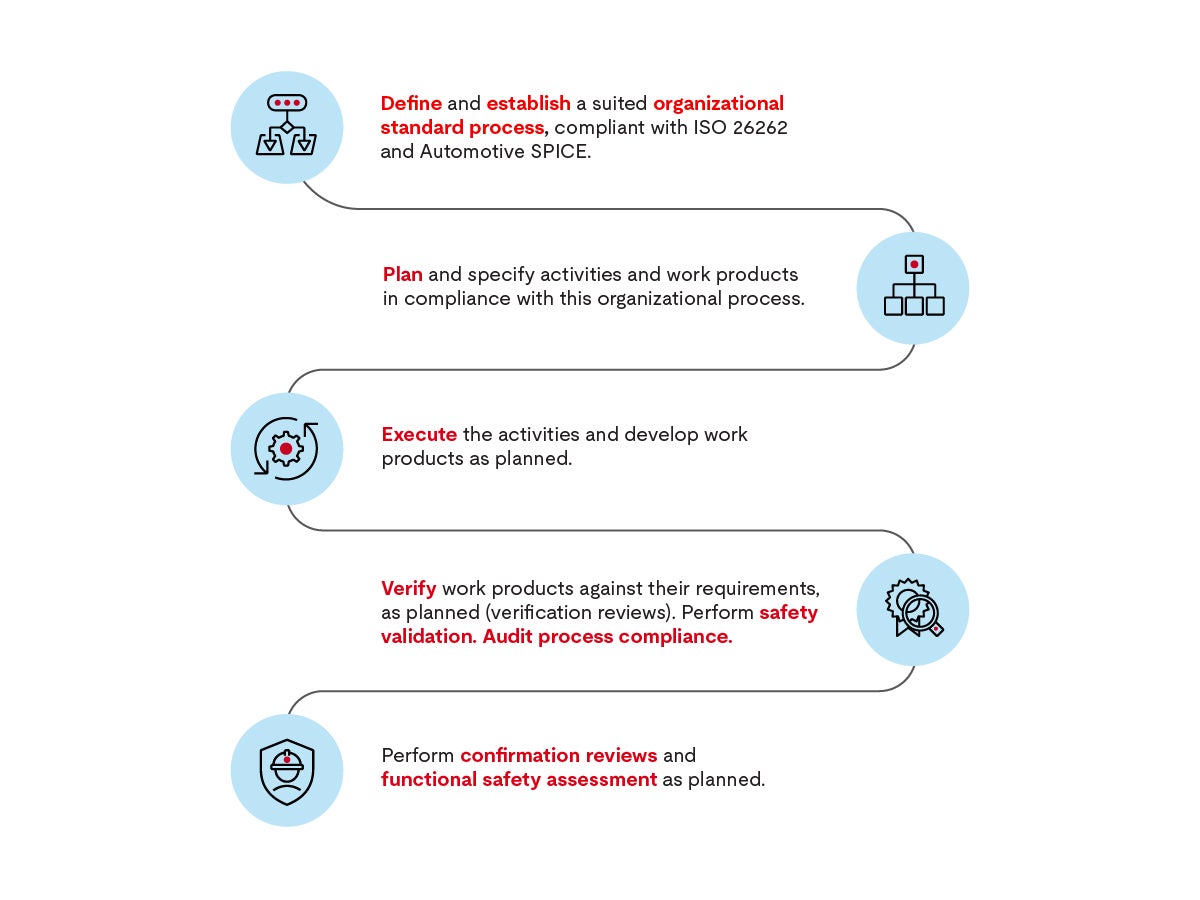
The goal of automotive functional safety is to help ensure that no one is exposed to unreasonable risk due to a malfunction in an electrical/electronic (E/E) system on the vehicle level or any of the systems contained therein.
Developing software, embedded electronic systems and other forms of technology are becoming increasingly complex. It is now necessary to develop a product in a systematic way to significantly reduce the probability of the occurrence of a malfunction. This necessitates meeting the requirements of ISO 26262, Functional safety for road vehicles, to reduce the risk of harm and product recalls, compensation claims and damage to brand reputation.
Overcoming automotive functional safety challenges
Although meeting the requirements of ISO 26262 can prove challenging on its own, manufacturers and suppliers must consider additional factors, as well, including:
- How to integrate ISO 26262 together with other standards in the existing development process.
- Safety analyses and how they interact with existing analyses.
- Efficiently creating the work products of ISO 26262.
- Determining completeness of the Safety Case and the safety analysis
- Identifying testing cases that will be in compliance with ISO 26262.
- Selecting appropriate methods.

Each of these considerations remains essential to maintaining safety as you design, develop and produce advanced automotive technology. UL Solutions has been deeply involved in the automotive industry for decades, and we have remained in step as technologies have continued to evolve. From developing a safety plan and designing staff training to reviewing hardware and software safety requirements, our experts can help you navigate today’s functional safety challenges with a holistic approach.
Comprehensive functional safety consulting and training
Functional safety cannot be viewed as an isolated discipline. Rather, it must be embedded into the system, hardware and software development processes. This is best done in conjunction with cybersecurity (ISO 21434), autonomy safety / SOTIF (ISO 21488, UL 4600), Automotive SPICE and other automotive standards and engineering best practices.
We can help you understand in detail what is expected to achieve functional safety according to ISO 26262 and can coach your team on both functional and autonomy training.

Consulting services for ISO 26262, Functional safety for road vehicles
Safety-related work products are critical to your functional safety case and require functional safety expertise to develop. UL Solutions experts can work alongside your development team to help you understand how to create work products required by ISO 26262. Our consulting services cover an array of topics, aligned to the parts of ISO 26262. Our consulting services cover an array of topics, including:
- Safety Plan and Safety Case (Part 2-6).
- Audit, Assessment and Confirmation Reviews (Part 2-6).
- Hazard Analysis and Risk Assessment (Part 3-6).
- Functional Safety Concept (Part 3-7) together with the functional safety requirements.
- Technical Safety Concept (Part 4-6) together with the technical safety requirements.
- System-Level Safety Analysis – FMEA, HAZOP, FTA or DFA (Part 4- 6).
- Hardware Safety Requirements (Part 5-6).
- Hardware Metrics Calculation with FMEDA (Part 5-8, 5-9).
- Hardware Verification & Testing Plan (Part 5-10).
- Software Safety Requirements (Part 6-6).
- Software Safety Analysis (like HAZOP, FMEA and FFI / DFA) (Part 6-7).
- Software Verification & Testing Plan (Part 6-9, 6-10, 6-11).
- System Integration and Test Plans (Part 4-7).
- Software tool criteria evaluation report; Software tool qualification report (Part 8-11).
- Efficient development of work products with a modular work product approach.
Establishing functional safety within your organization is also helpful. We can support this effort by helping you:
- Design and roll-out safety management systems.
- Improve processes to keep them up to date with the latest safety standards, e.g. ISO 26262.
- Coordinate or perform audits and assessments of your safety management process.
- Support and perform safety analysis.
- Build capabilities to assess the functional safety of electronic systems and components.
- Build capabilities to provide staff training on all aspects of functional safety and autonomy safety.
- Inspect development projects with DAkkS-accredited (C-Type Inspection Body) functional safety assessments (FSA).
- Work as a safety manager or safety engineer as a part of your project team.

Training to support ongoing functional safety
UL Solutions offers expert-lead training in multiple areas to support the automotive industry. We offer training dedicated specifically to Functional Safety. We also provide training on autonomy safety that may prove beneficial to your team.
We understand every aspect of automotive design and development is connected, and we take an integrative approach to helping your organization find success with your processes and products. This helps us ensure that we provide meaningful training, and it helps you feel confident that the knowledge you gain takes real world work into account.
Autonomy Safety and Functional Safety Sell Sheet
CFSP Training Semiconductor Sell Sheet
Manager Safety Sell Sheet
UL Certified Functional Safety Professional in Automotive
Get connected with our team
Contact us to learn more about our training and how we can help you understand and address the requirements of ISO 26262.

